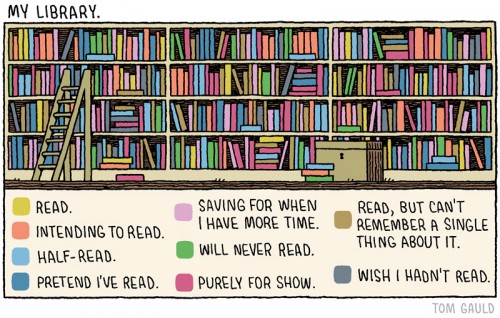Last week I shared a post I wrote about the growing expectations for readers. In that post I was critical of a program for book bloggers, Blogging for Books, that’s been developed by the Crown Publishing Group. After there was some chatter on Twitter about my post and the program generally, Kate Rados (@KateRados), Director of Community Development at Crown Publishing | Penguin Random House reached out to me and offered to answer any questions and respond to feedback about Blogging for Books.
While I stand by my original post and my criticisms of the program, my e-mails with Kate did address a few of the misperceptions I’ve seen floating around about the program that I think are worth mentioning here. I also have (many) thoughts on the idea of “blogging for books” more generally that I want to share. I hope non-book bloggers will forgive another post that is pretty “inside baseball” to the world of book blogging – I’ll be off my soapbox soon.
On Some Good Changes
Since the program launched in beta a few weeks ago, Crown has listened to feedback from bloggers and removed many of the most troubling requirements of the program. Michele’s (A Reader’s Respite) original post on this program sums up most of the terms that were originally included, most frustratingly requirements to post reviews on retail sites and social media and specific guidelines for what reviews should contain.
If you go back to read the Frequently Asked Questions today, nearly all of these requirements have been removed (the requirement that hasn’t been removed is a requirement to write a review – an issue I’ll address shortly). To my knowledge, there has never been a section that said all reviews had to be positive; they just ask for them to be honest. I’m glad they’ve pulled back in these significant ways.
Kate also emphasized to me that Blogging for Books is not required for bloggers who want to review Crown titles – a misperception that I think was fueled by some mistakes in the program’s beta roll-out. Several bloggers I know who use Edelweiss to request egalleys received rejection notices that told them they should sign up for this program. Kate noted on Twitter that this was a mistake and no one should have been rejected. Bloggers can still use other contacts and connections to request books.
On Review Consideration and Exchanges
One of the things that has not changed about the program, however, is the requirement that participants must post a review of every book they receive in order to receive their next book though the program. As Kate noted in an e-mail:
Regarding your questions about whether a review is required: it is. That is the nature of the program, which again is optional and a supplement to reviewers’ other methods of obtaining books from Crown. Via Blogging For Books, NetGalley, Edelweiss, and personal contact, a blogger is now able to access a wider array of titles across all Crown categories. Just as there is an understanding that a blogger would review a book after requesting it, we are reflecting that arrangement through Blogging For Books.
This is a non-starter for me when considering the program.
One of the phrases that has changed my reading/reviewing life is “for review consideration.” That’s how I answer every pitch, and I include it in every request that I make. I don’t promise a review and, in fact, I don’t review every book that I get – even books that I reach out and request specifically. This approach, making coverage decisions after seeing a book, is not possible with Blogging for Books, if a blogger wants to remain in good standing with the program.
By requiring a review for every book, Crown is, in essence, buying a blogger’s time and attention and the time and attention of a blogger’s readership for the cost of, at best, a hardcover book. As bloggers, it’s important to think about whether we should be bought for so little.
There’s also a little more at play in this comment, specifically the last sentence:
Just as there is an understanding that a blogger would review a book after requesting it, we are reflecting that arrangement through Blogging For Books.
This is not the arrangement for me and, frankly, I don’t think it should be the case for any blogger. It is not the relationship that publishers have with editorial media. In the comments to my last post, Teresa (Shelf Love) made a great comment that I think reflects this point:
I’d really love for all of us as bloggers to get away from using the language of exchange when we talk about review copies. It gives the impression that the review copy is “payment” for a review, which implies that a review is required upon receipt of a review copy. If a blogger wants to make that a personal policy, that’s fine, but because the exchange language is so widespread, I worry that it sets up unspoken assumptions and expectations
This is vitally important. We as bloggers have to stop talking about books in exchange for anything. We do not have exchange relationships with authors or publishers… and the sooner we make that point the better because the longer it continues the more we start to look like paid enthusiasts rather than critics.
On “Blogging for Books” in Theory
At the risk of sounding like a crabby old lady, the idea of “blogging for books” has some really negative connotations that feed into the issues with the language of exchange that has developed around review copies.
The phrase “blogging for books” suggests that the work of bloggers is done in service of publishers in order to get more books. That is just not the case – and not the motivation – for all the successful bloggers that I personally know.
When many of us started blogging five or six or seven years ago, the idea of getting books to review wasn’t even a consideration. Bloggers weren’t on publisher’s radars until they started to see us as active, engaged, excited readers they could reach out to directly. At that point, the narrative shifted to this idea of “working with” each other or that writing reviews was a “favor” that bloggers could do for authors/publishers. This remains a problem.
Writing about the latest books and having access to ARCs does not make a great blog and, in my experience, blogging for books is not a motivation that is going to help a blog remain vibrant and sustainable for any length of time. As Jenn (Jenn’s Bookshelves) succinctly tweeted last week: “I don’t blog for books. I blog because of my love of books and reading.”
I appreciate that the folks behind Blogging for Books have been responsive to criticisms raised about many requirements of the program. I think they deserve credit for making those changes and I appreciate that Kate took time to address some of my questions and concerns.
But I still don’t think this is a good program for book bloggers. Requiring a review allows a publisher a degree of editorial control that I’m not comfortable with. It also sets a bad precedent for other bloggers, especially new bloggers who may think that this is just the way things work. It’s not and it shouldn’t be. We each have set the standards we have for ourselves and, I hope, chose not to participate in a program that allows a publisher to have any control over the choices we make on our blogs. Your time and attention – and the time and attention of your readers – should not be sold for a book.
I’m really excited to start a discussion on some of these issues in the comments. However, I’d like to avoid focusing too much on the Blogging for Books program specifically. It’s not the only program of it’s kind, just the one getting attention right now. I’d rather talk more about how we as bloggers can challenge the increasingly prevalent idea that “book = review” — the bigger issue at stake here. Thanks in advance!


 It’s taken me forever to try and write a review for
It’s taken me forever to try and write a review for 
 Six days ago, astronaut Mark Watney became one of the first people to walk on Mars. Now, he’s sure he’ll be the first person to die there. After a dust storm nearly kills him and forces his crew to evacuate while thinking him dead, Mark finds himself stranded and completely alone with no way to even signal Earth that he’s alive — and even if he could get word out, his supplies would be gone long before a rescue could arrive. Chances are, though, he won’t have time to starve to death. The damaged machinery, unforgiving environment, or plain old “”human error”” are much more likely to kill him first. But Mark isn’t ready to give up yet. Drawing on his ingenuity, his engineering skills — and a relentless, dogged refusal to quit – he steadfastly confronts one seemingly insurmountable obstacle after the next. Will his resourcefulness be enough to overcome the impossible odds against him?”
Six days ago, astronaut Mark Watney became one of the first people to walk on Mars. Now, he’s sure he’ll be the first person to die there. After a dust storm nearly kills him and forces his crew to evacuate while thinking him dead, Mark finds himself stranded and completely alone with no way to even signal Earth that he’s alive — and even if he could get word out, his supplies would be gone long before a rescue could arrive. Chances are, though, he won’t have time to starve to death. The damaged machinery, unforgiving environment, or plain old “”human error”” are much more likely to kill him first. But Mark isn’t ready to give up yet. Drawing on his ingenuity, his engineering skills — and a relentless, dogged refusal to quit – he steadfastly confronts one seemingly insurmountable obstacle after the next. Will his resourcefulness be enough to overcome the impossible odds against him?” Ten years after graduating from high school in Neptune, California, Veronica Mars is back in the land of sun, sand, crime, and corruption. She’s traded in her law degree for her old private investigating license, struggling to keep Mars Investigations afloat on the scant cash earned by catching cheating spouses until she can score her first big case.
Ten years after graduating from high school in Neptune, California, Veronica Mars is back in the land of sun, sand, crime, and corruption. She’s traded in her law degree for her old private investigating license, struggling to keep Mars Investigations afloat on the scant cash earned by catching cheating spouses until she can score her first big case.